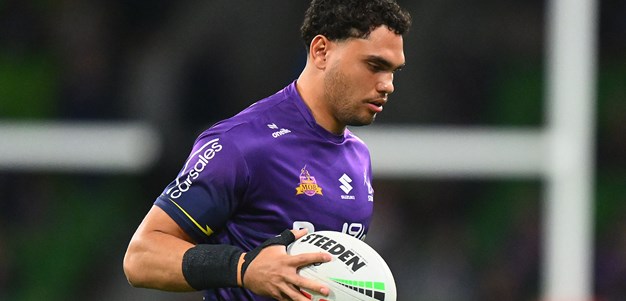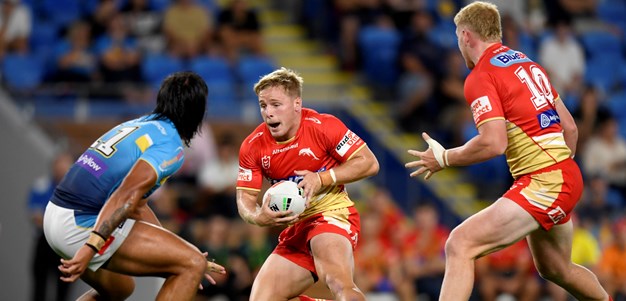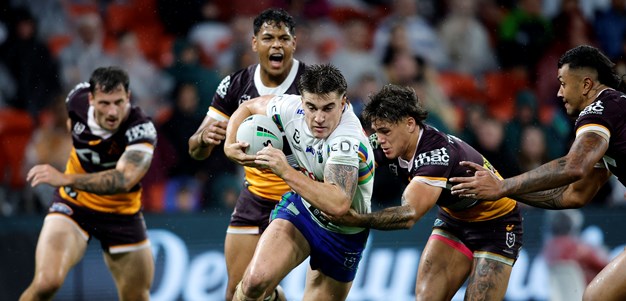Tina Turner probably didn't have Cameron Smith in mind when she released Simply the Best in 1989, but the pop superstar's classic track might just be the Storm skipper's theme song after he had arguably the greatest year by anyone in rugby league history.
Comparing players from different generations is fraught with danger, but we don't have to go too far back in time to put Smith's feats into context.
The Storm, Maroons and Kangaroos hooker has often been compared to Broncos great Darren Lockyer given their leadership roles and ability to make those around them rise to new heights, and when you're discussing great seasons, 'Locky's' 2006 has to be right up there.

The champion five-eighth faced adversity in every tournament he played that year yet still managed to guide Brisbane, Queensland and Australia to victory.
Having lost the State of Origin opener in heartbreaking fashion to a Brett Finch field goal, Queensland looked set to lose their fourth series in a row. A rookie coach with an ageing squad were vulnerable, but Lockyer rallied his troops with a man-of-the-match performance at Suncorp Stadium in Game Two to level the series.
The first interstate clash in nine years in Melbourne was always going to be full of drama, but most expected the Blues to continue their dominance south of the border. Things looked good when they opened up a 10-point lead, but after Brent Tate's long-range effort narrowed the gap, Lockyer intercepted a horrible pass from Brett Hodgson to score the try that would launch a record-breaking dynasty.
Lockyer was named man of the series but his incredible season was only just getting started.
Just two days after Queensland's famous win, Lockyer and his Broncos went down to the up-and-coming Storm in Melbourne in a low-scoring affair that would spark a five-game losing streak.
The last of those defeats – also to the Storm – saw Justin Hodges make the move from right centre to fullback. It didn't seem like much, but it would prove to be the masterstroke that turned Brisbane's season around.
Wayne Bennett's men lost one more game in 2006, and after rallying from 14 points down in the preliminary final, secured their spot in the decider against the Storm.
Having engineered the comeback win over Canterbury a week earlier, Lockyer played the role of conductor with a key hand in both of his team's tries before he sealed the upset win with a 35-metre field goal to send great mate Shane Webcke out a champion.
Premiership success would have been a fitting way to finish the season, but Lockyer had unfinished business to take care of.
The Kangaroos skipper was out for revenge in the 2006 Tri-Nations after he missed Australia's embarrassing 24-0 loss in the final 12 months earlier with a foot injury.
Just like the Origin decider and the NRL grand final, the game against New Zealand was anything but straightforward with the sides locked at 12-all after 80 minutes. It had been a draining year for Lockyer, but there was to be one last moment of glory as he backed up a Johnathan Thurston break to score the match-winning golden point try in the 87th minute.
Lockyer didn't just win those three trophies; he was responsible for them, and fittingly he took home the Golden Boot award that year for the second time in his career.
Few players have stepped up in the clutch moments quite like Lockyer did in 2006, but lurking in the background was a young hooker at the Melbourne Storm by the name of Cameron Smith. Few could have predicted then and there that he would match – and perhaps trump – his mentor's exploits more than a decade later, but the writing was on the wall as he claimed his first Dally M medal in a year that Lockyer dominated.
Smith's ability to control a game is unrivalled and despite being one of the more senior players in the competition, he is coming off arguably his best season in the NRL.
Having fallen at the final hurdle in 2016, the 34-year-old and his Melbourne teammates were out for revenge as they produced a scintillating brand of football to claim the premiership with ease.
Smith had a monumental season, losing just two games from 23 appearances as he broke just about every record imaginable.
In a whirlwind few months, Smith became the games record holder, broke through the 2000-point barrier, became the leading scorer amongst forwards, played the most games as captain and enjoyed the most wins by any player in league history.
His performance in the grand final was just about his best in Storm colours, with the fearless No.9 running for 129 metres – the most since Round 10, 2014 – while he also set up a try and made 40 tackles as Melbourne thrashed the Cowboys.
While he was mightily unlucky to miss out on the Clive Churchill medal, the individual honours flowed as Smith became the oldest player to win the Dally M while he was also named the Storm's player of the year for a record seventh time.
His exploits weren't confined to the purple jersey as he helped engineer a famous series win for a Maroons side that was supposedly past it.
Following a brutal loss at home in Game One, Queensland coach Kevin Walters made a stack of changes, with several experienced heads forced out to make way for the new brigade.
The series looked dead and buried in Sydney, only for the Maroons to engineer a trademark comeback to force a decider at the Cauldron.
Having made just 40 metres in the first two matches, Smith came out and warned the Blues that he would run the ball whenever possible in Game Three. Did they listen? Possibly. Did it make a difference? Absolutely not as the Immortal-in-waiting tore them to shreds through the ruck with 105 metres – more than any of the four starting props.
It's easy to forget what he's achieved in the green and gold jersey in 2017, but it's worth mentioning that he earned his 50th cap in the mid-year Test and he's on the cusp of leading the Aussies to World Cup success on home soil.
Fittingly, Smith claimed his second Golden Boot on Wednesday, and should the Kangaroos go on to win the World Cup, it will cap the greatest individual season that we've ever seen.
While very little separates the Queensland greats, a recent Twitter poll revealed that 74 per cent of people believe Smith's year was superior, and given social media is the realest news out there, it's clear that Cameron Smith – aka the Storm Machine – is simply the best.
Long time user, first time pollster.
— Martin Gabor (@MartinJGabor) November 26, 2017
Who had the better year? This includes #Origin #NRL and #RLWC2017ِ





